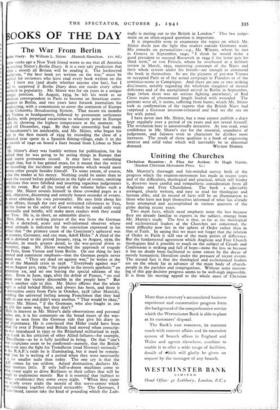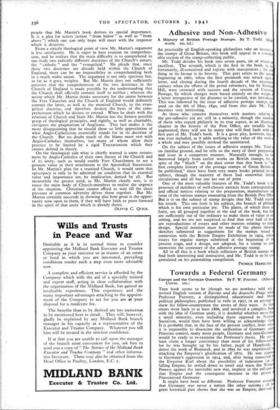Uniting the Churches
Christian Reunion : A Plea for Action. By Hugh Martin. (Student Christian Movement Press. 6s.)
MR. MARTIN'S thorough and fair-minded survey both of the progress which the reunion-movement has made in recent years and of the difficulties, theological and practical, which still hinder it, deserves most careful and sympathetic consideration from all Anglicans and Free Churchmen. The book .s admirably arranged, clearly written, and easy to read for theologian and layman alike, and its record of facts will be an illumination to those who have not kept themselves informed of what has already been attempted and accomplished in various quarters of the globe during recent years.
Two main facts, which need emphasis none the less because they are already familiar to experts in the subject, emerge from Mr. Martin's study. The first is that, so far as the theological and ecclesiastical leaders of the Churches are concerned, the main difficulty now lies in the sphere of Order rather than in that of Faith. In saying this we must not forget that the relation of Order to Faith is still one of the main points of difference. But the fundamental agreement which Anglican and Free Church theologians find it possible to reach on the subject of Creeds and Confessions is striking and full of hope—none the less so because it has no doubt been facilitated to some extent by the decay of merely humanistic liberalism under the pressure of recent events. The second fact is that the theological and ecclesiastical leaders are on the whole far in advance of the main body of church- people in the parishes and congregations. Without some narrow- ing of this gap decisive progress seems to be well-nigh impossible. It is from his moving appeal to the whole mass of Christian people that Mr. Martin's book derives its special importance. It is a plea for action (action " from below " as well as " from above ") which one can only hope will meet with the response which it deserves.
From a strictly theological point of view Mr. Martin's argument is less satisfactory. He is eager to base reunion on comprehen- sion, and he realises that the main difficulty is to comprehend in one body two radically different doctrines of the Church's nature, the " catholic " and the " evangelical." He pleads that, since these two doctrines are already held within the Church of England, there can be no impossibility in comprehending both in a much wider union. The argument is not only specious but, so far as it goes, weighty. But Mr. Martin does not sufficiently perceive that the comprehension of the two doctrines in the Church of England is made possible by the understanding that the Church shall officially commit itself to neither ; whereas the action which Mr. Martin thinks necessary for the union between the Free Churches and the Church of England would definitely commit the latter, as well as the reunited Church, to the evan- gelical doctrine, and therefore destroy the basis of the com- prehension which he desires to extend. When he deals with the relations of Church and State Mr. Martin has the firmest possible grasp of theological principles, and rightly, as well as charitably, castigates the pragmatism of Anglicans. This fact makes it the more disappointing that he should show so little appreciation of what Anglo-Catholicism essentially stands for in its doctrine of the Church. But no doubt much of the blame must rest with Anglo-Catholics themselves, too many of whom allow their practice to be limited by a rigid Tractarianism which they cannot defend in theory.
On the theological side what is chiefly wanted is some restate- ment by Anglo-Catholics of their own theory of the Church and of its unity, such as would enable Free Churchmen to see a genuine value in their attachment to the Apostolical Succession. In Mr. Martin's plan for a reunited Church, it would seem that episcopacy is only to be admitted on condition that its essential value and importance are, by implication, denied by all. But meanwhile the greater need, as Mr. Martin clearly sees, is to rouse the main body of Church-members to realise the urgency of the situation. Christians cannot afford to wait till the sheer pressure of common adversity drives them together. But Mr. Martin certainly succeeds in showing also how great is the oppor- tunity now open to them, if they will have faith to press forward in the spirit of that unity which is already theirs.
OLIVER C. QUICK.



























 Previous page
Previous page